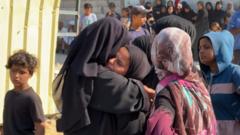Amid concerns of mass starvation, the Israeli Defense Forces have announced plans to facilitate aid transport and air drops into Gaza, a response to escalating humanitarian needs.
**Israel Announces New Humanitarian Aid Initiatives for Gaza Amid Ongoing Crisis**

**Israel Announces New Humanitarian Aid Initiatives for Gaza Amid Ongoing Crisis**
Israel prepares humanitarian corridors for aid delivery to Gaza as international pressure mounts.
Israel's Defense Forces (IDF) have revealed plans to establish humanitarian corridors aimed at facilitating aid transport into Gaza. Announced on Saturday, the IDF confirmed that it would allow United Nations (UN) convoys to deliver humanitarian aid directly into the besieged enclave. Additionally, the IDF stated that air drops of essential supplies would recommence, with the first drops including seven pallets of flour, sugar, and canned food sourced from international organizations.
This move comes in light of growing international advocacy urging Israel to increase aid access to Gaza, where organizations have warned of imminent mass starvation and even death from lack of food. The IDF emphasized their commitment to enhancing the humanitarian response within the Gaza Strip, indicating a readiness to initiate humanitarian pauses in areas heavily populated by civilians. However, they strongly rejected allegations of intentional starvation in Gaza, despite mounting evidence to the contrary.
In further developments, Israel announced it had resumed electricity supplies to a desalination plant in Gaza, which is expected to aid approximately 900,000 residents. While the UN and various humanitarian groups have pointed fingers at Israel for exacerbating the crisis, calling for unhindered access for aid delivery, the IDF placed the responsibility for food distribution on the UN and international aid organizations, cautioning that aid must not be intercepted by Hamas.
Since implementing a total cut-off of supplies to Gaza in March, Israel has faced criticism for its ongoing restrictions despite previously allowing some food into the area. Reports indicate that over 125 people have succumbed to malnutrition-related causes, including 85 children, according to health officials in Gaza.
This move comes in light of growing international advocacy urging Israel to increase aid access to Gaza, where organizations have warned of imminent mass starvation and even death from lack of food. The IDF emphasized their commitment to enhancing the humanitarian response within the Gaza Strip, indicating a readiness to initiate humanitarian pauses in areas heavily populated by civilians. However, they strongly rejected allegations of intentional starvation in Gaza, despite mounting evidence to the contrary.
In further developments, Israel announced it had resumed electricity supplies to a desalination plant in Gaza, which is expected to aid approximately 900,000 residents. While the UN and various humanitarian groups have pointed fingers at Israel for exacerbating the crisis, calling for unhindered access for aid delivery, the IDF placed the responsibility for food distribution on the UN and international aid organizations, cautioning that aid must not be intercepted by Hamas.
Since implementing a total cut-off of supplies to Gaza in March, Israel has faced criticism for its ongoing restrictions despite previously allowing some food into the area. Reports indicate that over 125 people have succumbed to malnutrition-related causes, including 85 children, according to health officials in Gaza.


















